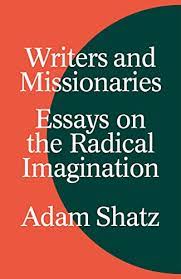 J. Howard Rosier interviews Adam Shatz about solidarity, the art of the essay, and his recent collection Writers and Missionaries in The Nation:
J. Howard Rosier interviews Adam Shatz about solidarity, the art of the essay, and his recent collection Writers and Missionaries in The Nation:
In 2014, Adam Shatz’s “Writers or Missionaries” appeared in The Nation, a piece about his relationship, as a Jewish American journalist, to the political conflicts in the Arab-speaking world. The article features, among other anecdotes, a bracing summary of Shatz’s discussion with V.S. Naipaul following 9/11, in which the late novelist divided reporters and journalists into two camps. “Writers”—those who describe the world as it is—are, in this formulation, diametrically opposed to “missionaries,” or those who render a picture of the world as they want to see it, their work serving as advocacy for a specific cause. While discussing his experience covering Algeria in 2002, Shatz turns this paradigm on its head. The issue is not whether it’s a mistake for a reporter to identify with a particular cause or camp. Rather, the essay gains its energy from Shatz’s constant reevaluation—a vacillation between surety and the unknown. (“This was not a matter of finding the story,” Shatz writes, “but of allowing the story to find me.”)
In Shatz’s debut collection, Writers and Missionaries: Essays on the Radical Imagination, this dichotomy is put to work. Examining novelists like Kamel Daoud, Michel Houellebecq, and Richard Wright, and scholars and pundits like Fouad Ajami, Edward Said, and Roland Barthes, the book serves as a series of case studies on how a writer’s relationship to politics shades both their decision-making and their work. A writer might gain notoriety or financial stability from a particular institution, but will it hinder what one is allowed to write? Does patriotism preclude saying certain things in public so as not to discredit political goals? What are the ethics of the personal becoming political (that is to say, outward), when a writer is putting forth bigotry and violence?
More here.
